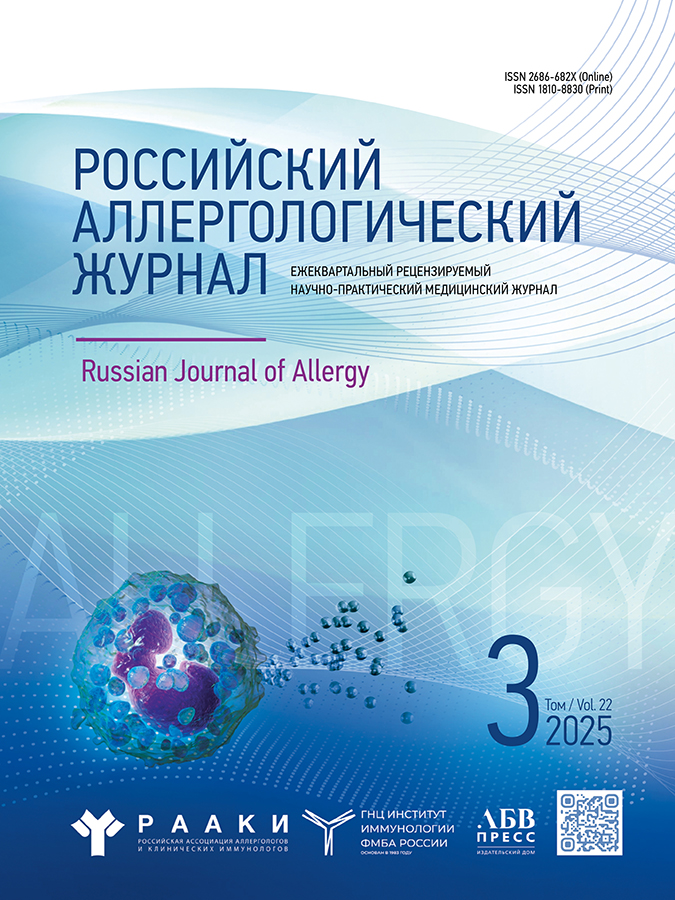ГЛЮКОЗАМИНИЛМУРАМИЛДИПЕПТИД В ТЕРАПИИ ПАЦИЕНТОВ С АТОПИЧЕСКОЙ БРОНХИАЛЬНОЙ АСТМОЙ И КЛИНИЧЕСКИМИ ПРОЯВЛЕНИЯМИ СИНДРОМА ВТОРИЧНОЙ ИММУННОЙ НЕДОСТАТОЧНОСТИ
- Авторы: Скороходкина О.В.1, Лунцов А.В.2
-
Учреждения:
- ФГБОУ ВО «Казанский государственный медицинский университет» Минздрава России
- Государственное автономное учреждение здравоохранения «Республиканская клиническая больница Министерства здравоохранения Республики Татарстан»
- Выпуск: Том 14, № 6 (2017)
- Страницы: 91-97
- Раздел: Статьи
- Дата подачи: 10.03.2020
- Дата публикации: 15.12.2017
- URL: https://rusalljournal.ru/raj/article/view/286
- DOI: https://doi.org/10.36691/RJA286
- ID: 286
Цитировать
Полный текст
Аннотация
Полный текст
Об авторах
Олеся Валерьевна Скороходкина
ФГБОУ ВО «Казанский государственный медицинский университет» Минздрава России
Email: olesya-27@rambler.ru
доктор медицинских наук, профессор кафедры клинической иммунологии с аллергологией. Россия, 420012, г. Казань, ул. Бутлерова, д. 49
Алексей Владимирович Лунцов
Государственное автономное учреждение здравоохранения «Республиканская клиническая больница Министерства здравоохранения Республики Татарстан»кандидат медицинских наук, врач аллерголог-иммунолог, заведующий центра. Россия, 420064, г. Казань, Оренбургский тракт, д. 138
Список литературы
- Сизякина ЛП, Чурюкина ЭВ. Клинико-иммунологическая характеристика фенотипа бронхиальной астмы с синдромом вторичной иммунной недостаточности. Российский Аллергологический Журнал. 2015; (2): 10-14.
- Хаитов РМ, Ильина НИ. Аллергология и иммунология. Национальное руководство. М., «ГЭОТАР-Медиа». 2012: 649.
- Несмеянов ВА. Глюкозаминилмурамилпептиды: на пути к пониманию молекулярного механизма биологической активности. International Journal of Immunorehabilitation. 1998; (10): 19-29.
- Караулов АВ, Калюжин ОВ. Иммунотерапия инфекционных болезней: проблемы и перспективы. Терапевтический архив. 2013; (11): 100-108.
- Колесникова НВ, Коков ЕА, Кокова ЛН, Чудилова ГА, Нехотина ИВ. Экспериментальная оценка механизмов IgE-супрессирующих эффектов мурамилдипептидов. Кубанский научный медицинский вестник. 2010; (1): 48-51
- Козлов ИГ, Гурьянова СВ, Колесникова НВ, Андронова ТМ. Мурамилдипептиды и другие агонисты рецепторов врожденного иммунитета в комплексной терапии аллергических заболеваний. Российский Аллергологический Журнал. 2015; (5): 59-67.
- Wong CK, Hu S, Leung KM, Dong J, He L, Chu YJ et al. NOD-like receptors mediated activation of eosinophils interacting with bronchial epithelial cells: a link between innate immunity and allergic asthma. Cell Mol Immunol. 2013; 10(4): 317-329.
- Duan W, Mehta AK, Magalhaes JG, Ziegler SF, Dong C, Philpott DJ et al. Innate signals from NOD2 block respiratory tolerance and program T(H)2-driven allergic inflammation. J Allergy Clin Immunol. 2010; 126(6): 1284-1293.
- Kvarnhammar AM, Petterson T, Cardell LO. NOD-like receptors and RIG-I-like receptors in human eosinophils: activation by NOD1 and NOD2 agonists. Immunology. 2011; 134(3): 314-325.
- Лусс ЛВ. Вторичная иммунная недостаточность и имму-нокомпрометированный пациент. Аллергология и иммунология в педиатрии. 2007; (2): 6-11.
Дополнительные файлы



